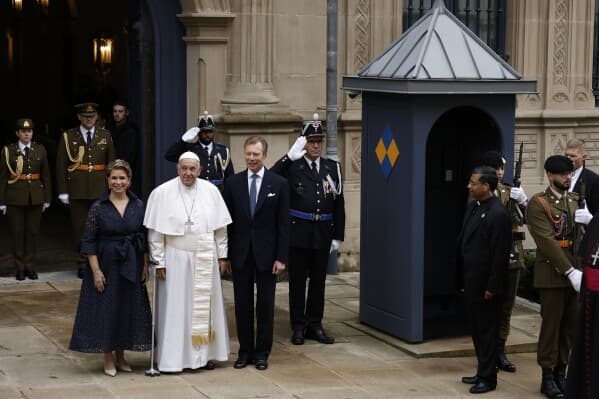As Pope Francis begins his trip to Luxembourg and Belgium, Cardinal Secretary of State Pietro Parolin says Europe is “increasing the risk of falling back into the tragic errors of those times.”
The pontiff arrived in Luxembourg on Thursday and will return from Belgium on Sep. 29. The two small nations are central to the European Union, and ahead of the trip Parolin told Vatican Media he hopes the pope’s visit “becomes a precious opportunity for Europe to rediscover its foundational values.”
“These are two countries that are founding members of the European Union and host EU institutions, where Catholicism, although still formally the majority, often seems no longer considered a relevant part of life and is almost marginalized in society,” the cardinal said.
Parolin was asked about how Europe is divided over questions on life issues, the plight of migrants, and the rising problems of war.
He noted that immediately after World War II, the European peoples “were exhausted.”
“The previous thirty years had been so filled with calamities and sufferings that they became resolute and bold in building a new order capable of preventing the resurgence of the extreme nationalisms that had caused the conflicts,” the cardinal told Vatican Media.
“Now, on the contrary, Europe has somewhat lost the memory of the immense calamities of the past, thereby increasing the risk of falling back into the tragic errors of those times. I hope that the Holy Father’s visit becomes a precious opportunity for Europe to rediscover its foundational values,” he continued.
“While in 1945, European peoples were propelled towards a future that could only be imagined as better than the past, today they seem to view the future as an entirely unknown time or even worse than the recent past. This way of thinking affects the very capacity to embrace life and spreads a climate of resignation where hope does not dwell,” Parolin said.
The cardinal told Vatican Media “it is undeniable” that European civilization has its roots in Greco-Roman culture and owes its values to the Judeo-Christian tradition.
“Christianity, in particular, has profoundly reshaped the European landscape over the centuries. The cathedrals, universities, art, the development of its institutions, and a thousand other aspects are proof of this, having, so to speak, made Europe as we know it,” he said.
“Compared to all this, the European Constitution preferred not to explicitly state these strong ties with the cultural and religious heritage of the past, believing that they would be divisive or that such recognition would make these roots burdensome and hinder new developments,” Parolin said.
“The outcome of this choice is the exacerbation of a certain confusion that does not help in building the European project. Indeed, to find the strength for a new leap that allows reaching new and important goals, overcoming ever-resurgent selfishness, Europe greatly needs to rediscover its roots. If it intends to be a voice that is heard and authoritative in today’s world and if it wants to overcome exhausting impasses, it needs to rediscover the greatness of the values that inspired it, values well-known to the founders of modern Europe,” he continued.
He said Pope Francis is a “pilgrim of hope” and wants Europe to rediscover the reasons that were the foundation of its construction, so that it can address every issue, including economic or migration ones, with a forward-looking spirit of solidarity and overcome the “demographic winter.”
The cardinal said populism, polarization, and fear which currently are affecting Europe are often “the result of the weariness of spirit and thought, as well as the consequent demand for almost magical simplifications capable of solving complicated or even epochal problems with simple and swift effective decisions.”
“This weariness of the peoples ends up making them available to embrace radical proposals that promise the impossible, only to discover that such promises were unachievable, resulting in turning to other narratives, which are opposing in content but very similar in the assertiveness of language,” Parolin told Vatican Media.
He said the Church employs the language of responsibility, moderation, and “warning of the risks that can befall if dangerous paths are taken, condemning the most perilous errors.”
“For this reason, such language does not lend itself to easy simplification and does not always present immediate solutions. However, the Holy Father’s words originate from the Gospel and are always words of wisdom. They are realistic, as the Gospel is realistic, which does not promise Paradise without the Cross,” the cardinal said.
“The pope’s voice teaches us to beware and to maintain our critical sense towards those who offer the peoples, tired for various reasons, immediate simplified recipes for redemption. Generally, these result in recipes for disaster,” Parolin said.













